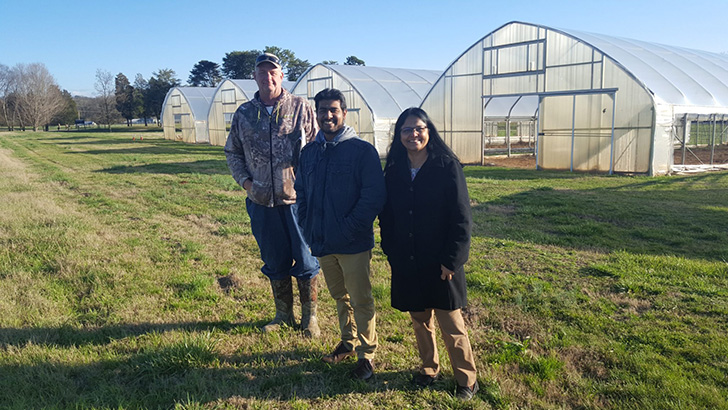| |
New UTIA study to examine organic production of grains
Joint effort between UTIA and MTSU results in
multidisciplinary, three-year study

Conventionally grown grains make up 33% of Tennessee's gross agricultural income, but very little of that production utilizes organic systems. A grant from USDA will support a team of researchers from UTIA and MTSU to address this issue. Image by UTIA |
KNOXVILLE – The University of Tennessee Institute of Agriculture has been awarded a $500,000 grant from USDA to address a common problem faced in Tennessee agriculture: how to effectively transition grain cropping systems to organic systems while decreasing the dependence on intensive tillage.
“Organic crop systems typically depend on intensive and frequent tillage operations,” states Sindhu Jagadamma, assistant professor in the Department of Biosystems Engineering and Soil Science and lead investigator on the project. “However, most row crop producers in Tennessee follow no-till management practices. Developing viable organic systems that do not heavily depend on tillage can help progressive farmers transition to organic systems.”
Currently, conventionally grown grains like corn, soybeans and wheat contribute to 33% of Tennessee’s gross agricultural income, but the state lags behind in organic production of these same crops.
The research team hopes to tackle several key production challenges that prevent producers from transitioning to organic practices. Starting this fall, four organic grain crop rotations will be tested at two Tennessee locations: the Organic Crops Unit in Knoxville, part of UT’s East Tennessee AgResearch and Education Center, and the Experiential Learning and Research Center operated by the Middle Tennessee State University in Lascassas, Tennessee. Tillage and cover crop management for organic corn-soybean-wheat rotations will be explored at both locations to identify changes that can increase profitability as well as environmental sustainability of Tennessee farming operations looking to transition to organic practices.
“Organic systems rely on organic nutrient sources, such as legume cover crops or animal manure, and are expected to limit nutrient loss from the production system,” adds Debasish Saha, assistant professor in the UT Department of Biosystems Engineering and Soil Science.

Members of the research team identify field trial locations at UTIA’s East Tennessee AgResearch and Education Center. From left to right, Bill Lively, Organic Crops Unit supervisor for UT AgResearch, Debasish Saha, and Sindhu Jagadamma. Image courtesy UTIA. |
The three-year study is funded by USDA’s National Institute of Food and Agriculture’s Organic Transitions program and will investigate the agronomic, economic and ecological outcomes of organic grain production in Tennessee. The research team is comprised Jagadamma and Saha; Bonnie Ownley, professor in the UT Department of Entomology and Plant Pathology; Aaron Smith, associate professor in the UT Department of Agricultural and Resource Economics; Song Cui, associate professor in the Department of Plant and Soil Science at Middle Tennessee State University; and Ravi Neelipally, Ph.D. student in the UT Department of Biosystems Engineering and Soil Science. The team’s project should address the growing demand for organic produce as well as help producers transform production practices to be more sustainable for the future generations.
Through its land-grant mission of research, teaching and extension, the University of Tennessee Institute of Agriculture touches lives and provides Real. Life. Solutions. utia.tennessee.edu.
Source: UTIA
Published September 23, 2020 |

